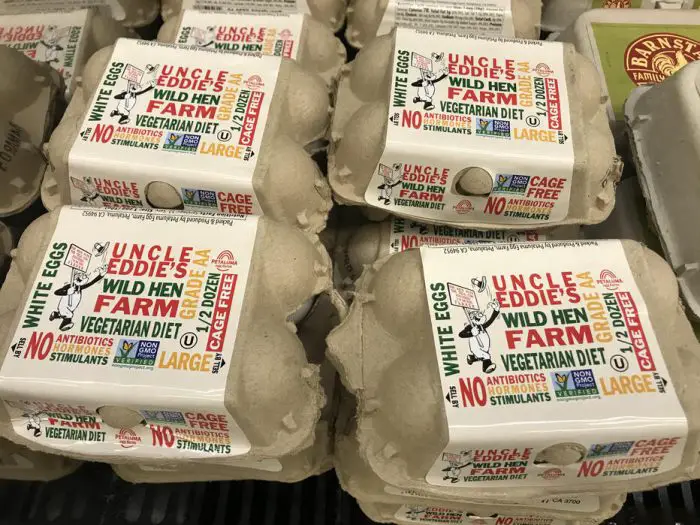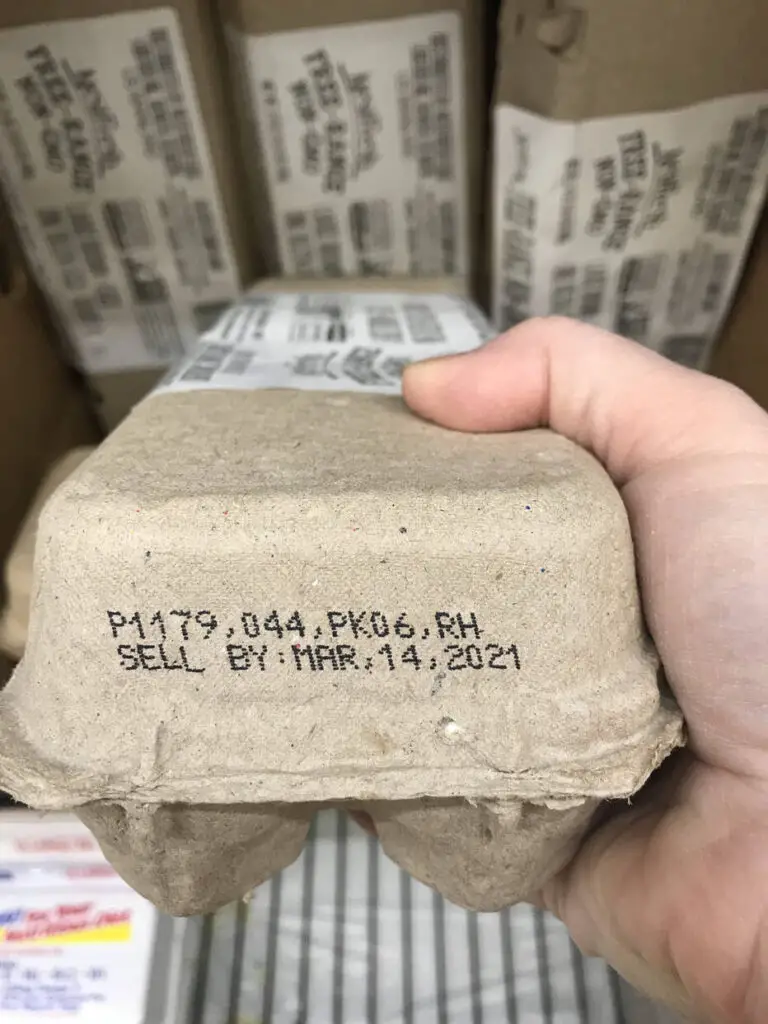
Storing eggs on your countertop is common in most countries. Egg laws in the United States require supermarket eggs to be stored in the refrigerated section to prevent us from getting sick. The difference in storage requirements has to do with the way the chickens and eggs were handled before you purchased them.
Why do Other Countries Store Eggs on Countertops?
In many other countries, such as Europe and the UK, eggs that are to appear on an unrefrigerated supermarket shelf are not to be washed and sanitized. Unwashed eggs still have the bloom or cuticle on them, which helps to protect bacteria from entering and contaminating the egg. As long as the egg remains at a cool room temperature, it can remain on the countertop.
In EU countries that do not wash eggs, they give laying hens antibiotics that will prevent them from developing or passing salmonella to the eggs.
Egg laws in the United States say that supermarket eggs are to be washed and sanitized. During this washing and sanitizing, most of the bloom or protective coating is washed off, leaving it at risk of becoming contaminated.

Increases egg laying naturally.
- Improves chicken health.
- Deters parasites: mites, lice, fleas, flies & rodents.
- On SALE!
- SHOP NOW
Some states will spray eggs with an odorless and colorless mineral oil to protect bacteria from getting through the porous shell. In either case, all eggs in the United States are by law to be refrigerated at or below 45 degrees Fahrenheit to prevent bacteria from growing inside the egg.
Can I Store My Supermarket Eggs on the Countertop?
No, you should never store your supermarket eggs on the countertop. By law, supermarket eggs have to be sold to the consumer cold. Once you remove eggs from the refrigerator they should be used within 2 hours. This is to prevent the contamination of the egg with bacteria.

When a cold egg is removed from the refrigerator and set out on a countertop of a room that is much warmer than it is, it will begin to sweat. This sweat is the perfect environment for bacteria to attach and make its way inside the egg. This is why it is important to use the eggs right after you remove them from the refrigerator.
Because of egg laws in the United States, supermarket eggs must be stored in the refrigerated section at no higher than 45 degrees Fahrenheit. As soon as you get home, it is important to put your eggs away, towards the back of the fridge.
Never store your eggs on the door because items on the door are subjected to varying temperatures. If your household is anything like mine, the door is opened and closed a lot throughout the day!
Can I Store Farm Fresh Eggs On My Countertop?
Yes, you can store farm fresh eggs on your countertop, as long as they have not been washed or previously in the refrigerator at all since being laid. Once you put farm fresh eggs into the refrigerator, they need to remain in there until you are ready to use them.

Even though farm eggs still have the protective bloom on them that protects bacteria from contaminating the egg, if you remove them from the refrigerator, they will sweat. This sweat breaks down the cuticle of the egg, leaving it at risk of contamination.
In conclusion, all eggs that have been refrigerated need to be used within 2 hours of removal to prevent contamination.
USA Guidelines for Egg Production
The Food and Drug Administration, FDA, has egg safety rules for farmers during egg production and rules for what temperatures the eggs must stored and transported at. This is to avoid the possibility of the consumer from becoming infected with a foodborne illness, such as salmonella.
Salmonella Enteritidis is one of the leading causes of foodborne illnesses in the United States so the FDA put regulations on farmers to take precautionary measures to prevent eggs from becoming contaminated with the bacteria that causes this.
What is Salmonella?
Salmonella or “salmonella enterica” is a bacteria that is responsible for causing a disease caused salmonellosis. Some people refer to it as “food poisoning.” It is the most common foodborne related illness in the US. The scary thing is that you cannot see, smell or taste it.


Salmonella can be found in eggs, meats, fruits, vegetables. It is more common to ingest salmonella bacteria if you ingest raw or uncooked meat, seafood or eggs.
It is found in the intestines of people, animals and birds and can be transmitted by eating foods that are contaminated with feces.
Symptoms of Salmonella
If you become infected with salmonella, the most common symptoms are pain or aching in your belly, followed by nausea, diarrhea, vomiting and fever.
Symptoms can start anywhere from 6 hours to 6 whole days after ingested and it can take up to 7 days to recover.
Treatment of Salmonella
Most people can recover on their own at home, but in severe cases may need to be hospitalized. For those that need hospitalized it is usually because it has infected their intestines and into their bloodstream requiring antibiotics.
People that are increased risk are the elderly, very young and those with compromised immune systems.
Salmonella is most common in the warmer months because the bacteria salmonella grows best in a warm and humid environment.

Egg Laws in the United States
The United States has strict guideline that egg producers, transporters and supermarkets must comply with. This includes laws for egg production, labeling, egg storage temperature during transportation, grading and quality. For our health and safety, as a consumer of eggs, we trust that the USDA continually enforces all of these standards.
Egg Producer Guidelines
- Must register with the FDA and keep documents that they are following guidelines.
- Employees cannot own birds at home.
- Must have pest and rodent control measures in place at facility.
- Facility should be cleared of debris that pests or rodents can use to make their hiding place.
- Prevent wild animals from entering farm.
- Must limit the amount of visitors to the farm.
- If salmonella was detected from an egg test, the whole facility must be completely cleaned and sanitized before new laying hens can be brought in.
- 36 hours after being laid, eggs must be kept at an ambient temperature of 45 degrees or lower, including egg storage during transportation to supermarkets.
- Producers must conduct environmental inspections for salmonella when the laying hens are 40-45 weeks of age, 4-6 weeks after molting
- If an outbreak of salmonella is detected during an environmental test, producers must have an egg inspection for salmonella.
- Egg producers must have documentation stating that the eggs were raised under salmonella monitored conditions.
Labeling Regulations
The U.S. also has strict requirements on labeling of consumer-grade eggs. All packages of eggs must have specific items labeled on the package.
| REQUIRED ON ALL EGG CARTONS |
|---|
| NAME |
| ADDRESS |
| ZIP CODE |
| QUANTITY OF EGGS |
| “KEEP REFRIGERATED” ON LABEL |
| USDA PLANT OF ORIGIN CODE # |
| USDA SHELL EGG SURVEILLANCE # |
| *SIZE |
| *GRADE |
| *SEFS COMPLIANT |
| JULIAN DATE |
A Julian Date is the date that the eggs were packaged. It is 3 numbers. Eggs packaged on January 3rd would be a Julian Date of 003 and eggs packaged on December 31st would have a Julian Date of 365.

Egg Quality and Grading Regulations
Eggs are sold in various sizes: pee-wee, small, medium, large, x-large and jumbo. Eggs are graded for both internal and external quality and are given a grade A, AA or B. So what is A, AA and B and how big is a pee-wee egg?
| GRADE | DESCRIPTION |
|---|---|
| A | MOST POPULAR IN MARKET. EXTERIOR PERFECT. INTERIOR- WHITES NOT AS THICK. |
| AA | ALMOST PERFECT. HIGHEST QUALITY EGG IN MARKET. SHELLS CLEAN AND UNBROKEN, YOLK IS HIGH AND ROUND, EGG WHITE IS THICK AND FIRM. |
| B | INTERIOR AND EXTERIOR NOT OF HIGH QUALITY. THINNER WHITES, FLATTER AND WIDER YOLKS. NOT USUALLY IN MARKETS. INSTEAD USED FOR TO MAKE LIQUID OR DRIED EGGS. |
The USDA does not have a regulation on the exact weight an egg should be for each of the 6 classes, but instead they have a regulation for how much 1 dozen of each type of egg should weigh. This is why when you purchase eggs, they are all close to the same size.
| SIZE | WEIGHT / DOZEN |
|---|---|
| PEE-WEE | 15 oz |
| SMALL | 18 oz |
| MEDIUM | 21 oz |
| LARGE | 24 oz |
| X-LARGE | 27 oz |
| JUMBO | 30 oz |
What You Need to Know About Egg Safety
When you purchase eggs from a local farmer, ask them if the eggs were previously washed or refrigerated. If not, it is ok for you to leave them out on your countertop.
If you wash your farm fresh eggs or put them into your refrigerator, they must remain in your refrigerator until you are ready to use them.
If you are storing your eggs in your refrigerator, place them in the back of the fridge. This is the location that the temperature is likely to fluctuate the least when the door is opened.
Any egg that has been refrigerated must be used within 2 hours after removing from your refrigerator. Eggs will sweat when taken out of the fridge and are at risk of absorbing bacteria through the shell.

Conclusion: Why Storing Eggs on Your Countertop Can Make You Sick
Depending upon how the eggs were handled before you got them determines if it is safe for you to store on your countertop. Unwashed, unrefrigerated eggs can remain on your countertop. Once eggs have been refrigerated they must remain refrigerated until you are ready to use them. By following egg storage guidelines, you are very unlikely to get sick.

Increases egg laying naturally.
- Improves chicken health.
- Deters parasites: mites, lice, fleas, flies & rodents.
- On SALE!
- SHOP NOW



